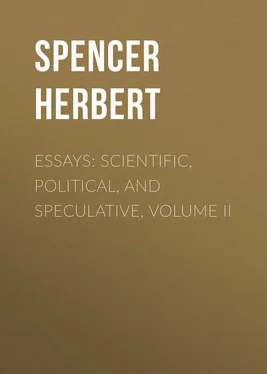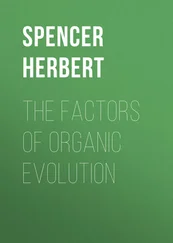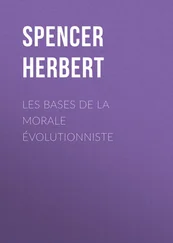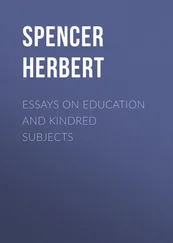Herbert Spencer - Essays - Scientific, Political, and Speculative, Volume II
Здесь есть возможность читать онлайн «Herbert Spencer - Essays - Scientific, Political, and Speculative, Volume II» — ознакомительный отрывок электронной книги совершенно бесплатно, а после прочтения отрывка купить полную версию. В некоторых случаях можно слушать аудио, скачать через торрент в формате fb2 и присутствует краткое содержание. Жанр: Философия, foreign_antique, foreign_prose, sketch, на английском языке. Описание произведения, (предисловие) а так же отзывы посетителей доступны на портале библиотеки ЛибКат.
- Название:Essays: Scientific, Political, and Speculative, Volume II
- Автор:
- Жанр:
- Год:неизвестен
- ISBN:нет данных
- Рейтинг книги:5 / 5. Голосов: 1
-
Избранное:Добавить в избранное
- Отзывы:
-
Ваша оценка:
- 100
- 1
- 2
- 3
- 4
- 5
Essays: Scientific, Political, and Speculative, Volume II: краткое содержание, описание и аннотация
Предлагаем к чтению аннотацию, описание, краткое содержание или предисловие (зависит от того, что написал сам автор книги «Essays: Scientific, Political, and Speculative, Volume II»). Если вы не нашли необходимую информацию о книге — напишите в комментариях, мы постараемся отыскать её.
Essays: Scientific, Political, and Speculative, Volume II — читать онлайн ознакомительный отрывок
Ниже представлен текст книги, разбитый по страницам. Система сохранения места последней прочитанной страницы, позволяет с удобством читать онлайн бесплатно книгу «Essays: Scientific, Political, and Speculative, Volume II», без необходимости каждый раз заново искать на чём Вы остановились. Поставьте закладку, и сможете в любой момент перейти на страницу, на которой закончили чтение.
Интервал:
Закладка:
From our present point of view, then, it becomes obvious that the conception of a serial arrangement of the sciences is a vicious one. It is not simply that, as M. Comte admits, such a classification “will always involve something, if not arbitrary, at least artificial;” it is not, as he would have us believe, that, neglecting minor imperfections such a classification may be substantially true; but it is that any grouping of the sciences in a succession gives a radically erroneous idea of their genesis and their dependencies. There is no “one rational order among a host of possible systems.” There is no “true filiation of the sciences.” The whole hypothesis is fundamentally false. Indeed, it needs but a glance at its origin to see at once how baseless it is. Why a series ? What reason have we to suppose that the sciences admit of a linear arrangement? Where is our warrant for assuming that there is some succession in which they can be placed? There is no reason; no warrant. Whence then has arisen the supposition? To use M. Comte’s own phraseology, we should say, it is a metaphysical conception. It adds another to the cases constantly occurring, of the human mind being made the measure of Nature. We are obliged to think in sequence; it is a law of our minds that we must consider subjects separately, one after another: therefore Nature must be serial – therefore the sciences must be classifiable in a succession. See here the birth of the notion, and the sole evidence of its truth. Men have been obliged when arranging in books their schemes of education and systems of knowledge, to choose some order or other. And from inquiring what is the best order, have fallen into the belief that there is an order which truly represents the facts – have persevered in seeking such an order; quite overlooking the previous question whether it is likely that Nature has consulted the convenience of book-making. For German philosophers, who hold that Nature is “petrified intelligence,” and that logical forms are the foundations of all things, it is a consistent hypothesis that as thought is serial, Nature is serial; but that M. Comte, who is so bitter an opponent of all anthropomorphism, even in its most evanescent shapes, should have committed the mistake of imposing upon the external world an arrangement which so obviously springs from a limitation of the human consciousness, is somewhat strange. And it is the more strange when we call to mind how, at the outset, M. Comte remarks that in the beginning “ toutes les sciences sont cultivées simultanément par les mêmes esprits ;” that this is “ inevitable et même indispensable ;” and how he further remarks that the different sciences are “ comme les diverses branches d’un tronc unique .” Were it not accounted for by the distorting influence of a cherished hypothesis, it would be scarcely possible to understand how, after recognizing truths like these, M. Comte should have persisted in attempting to construct “ une échelle encyclopédique .”
The metaphor which M. Comte has here so inconsistently used to express the relations of the sciences – branches of one trunk – is an approximation to the truth, though not the truth itself. It suggests the facts that the sciences had a common origin; that they have been developing simultaneously; and that they have been from time to time dividing and sub-dividing. But it fails to suggest the fact, that the divisions and sub-divisions thus arising do not remain separate, but now and again re-unite in direct and indirect ways. They inosculate; they severally send off and receive connecting growths; and the intercommunion has been ever becoming more frequent, more intricate, more widely ramified. There has all along been higher specialization, that there might be a larger generalization; and a deeper analysis, that there might be a better synthesis. Each larger generalization has lifted sundry specializations still higher; and each better synthesis has prepared the way for still deeper analysis.
And here we may fitly enter upon the task awhile since indicated – a sketch of the Genesis of Science, regarded as a gradual outgrowth from common knowledge – an extension of the perceptions by the aid of the reason. We propose to treat it as a psychological process historically displayed; tracing at the same time the advance from qualitative to quantitative prevision; the progress from concrete facts to abstract facts, and the application of such abstract facts to the analysis of new orders of concrete facts; the simultaneous advance in generalization and specialization; the continually increasing subdivision and reunion of the sciences; and their constantly improving consensus .
To trace out scientific evolution from its deepest roots would, of course, involve a complete analysis of the mind. For as science is a development of that common knowledge acquired by the unaided senses and uncultured reason, so is that common knowledge itself gradually built up out of the simplest perceptions. We must, therefore, begin somewhere abruptly; and the most appropriate stage to take for our point of departure will be the adult mind of the savage.
Commencing thus, without a proper preliminary analysis, we are naturally somewhat at a loss how to present, in a satisfactory manner, those fundamental processes of thought out of which science originates. Perhaps our argument may be best initiated by the proposition, that all intelligent action whatever depends upon the discerning of distinctions among surrounding things. The condition under which only it is possible for any creature to obtain food and avoid danger, is, that it shall be differently affected by different objects – that it shall be led to act in one way by one object, and in another way by another. In the lower orders of creatures this condition is fulfilled by means of an apparatus which acts automatically. In the higher orders the actions are partly automatic, partly conscious. And in man they are almost wholly conscious. Throughout, however, there must necessarily exist a certain classification of things according to their properties – a classification which is either organically registered in the system, as in the inferior creation, or is formed by conscious experience, as in ourselves. And it may be further remarked, that the extent to which this classification is carried, roughly indicates the height of intelligence – that, while the lowest organisms are able to do little more than discriminate organic from inorganic matter; while the generality of animals carry their classifications no further than to a limited number of plants or creatures serving for food, a limited number of beasts of prey, and a limited number of places and materials; the most degraded of the human race possess a knowledge of the distinctive natures of a great variety of substances, plants, animals, tools, persons, &c.; not only as classes but as individuals.
What now is the mental process by which classification is effected? Manifestly it is a recognition of the likeness or unlikeness of things, either in respect of their sizes, colours, forms, weights, textures, tastes, &c., or in respect of their modes of action. By some special mark, sound, or motion, the savage identifies a certain four-legged creature he sees, as one that is good for food, and to be caught in a particular way; or as one that is dangerous; and acts accordingly. He has classed together all the creatures that are alike in this particular. And manifestly in choosing the wood out of which to form his bow, the plant with which to poison his arrows, the bone from which to make his fish-hooks, he identifies them through their chief sensible properties as belonging to the general classes, wood, plant, and bone, but distinguishes them as belonging to sub-classes by virtue of certain properties in which they are unlike the rest of the general classes they belong to; and so forms genera and species.
Читать дальшеИнтервал:
Закладка:
Похожие книги на «Essays: Scientific, Political, and Speculative, Volume II»
Представляем Вашему вниманию похожие книги на «Essays: Scientific, Political, and Speculative, Volume II» списком для выбора. Мы отобрали схожую по названию и смыслу литературу в надежде предоставить читателям больше вариантов отыскать новые, интересные, ещё непрочитанные произведения.
Обсуждение, отзывы о книге «Essays: Scientific, Political, and Speculative, Volume II» и просто собственные мнения читателей. Оставьте ваши комментарии, напишите, что Вы думаете о произведении, его смысле или главных героях. Укажите что конкретно понравилось, а что нет, и почему Вы так считаете.












